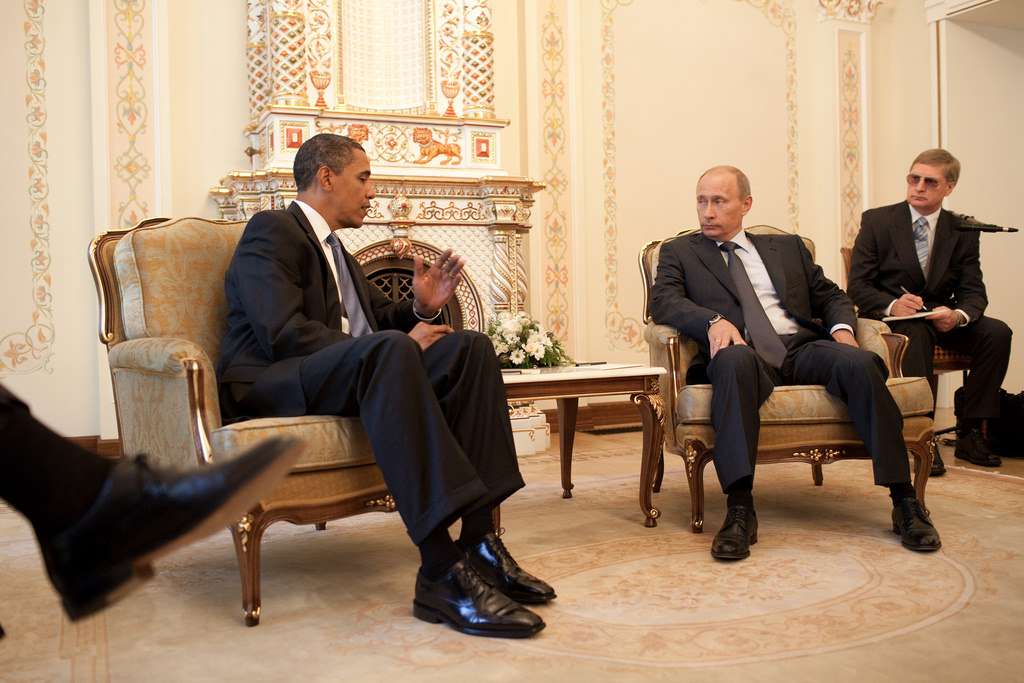Russia Didn't Invade Ukraine Because of US 'Weakness'
Whenever the United States fails to use violence abroad-a rarity-politicians and pundits howl about America's "credibility" being at stake.

One of the more vivid political talking points to come out of Washington in the midst of Russia's military incursions into Ukraine is that Russian President Vladimir Putin carried out such provocative actions because Obama's failure to enforce his "red line" on Syria and commence with a bombing campaign this past fall signaled to Putin he would not face consequences.
"I really believe that when Vladimir Putin looks around the world—sees what happened in Syria when the red line turned pink and the president didn't act," Republican Senator John McCain told CNN, "I think he's emboldened and he's acting."
The Wall Street Journal, similarly, put it down to "Western weakness," arguing "it's no coincidence that Mr. Putin asserted himself in Ukraine not long after Mr. Obama retreated in humiliating fashion from his 'red line' in Syria."
The truth is, anyone who actually believes Putin took military action in Ukraine because Obama backed away from his plans to bomb Syria illegally, doesn't know anything about international relations.
First of all, the most immediate parallel to Russia's occupation of Crimea, Ukraine's semi-autonomous peninsula, is Russia's 2008 military action in Georgia, another former Soviet state that was leaning too far West for Moscow's comfort. Following violent skirmishes, Russian forces occupied Georgia's separatist provinces of South Ossetia and Abkhazia.
This happened during the George W. Bush administration, which was so willing to use military force that it invaded Iraq on trumped up pretexts and in violation of international law. If Moscow were taking its cues based on Washington's willingness to use force, surely it would have held back in Georgia for fear of retaliation from the Bush administration.
Whenever the United States fails to act with violence abroad—a rarity, mind you—you have politicians and pundits howling about America's "credibility" being at stake. If other countries see us backing down, goes the thinking, they won't properly fear U.S. power and therefore they'll be unrestrained in their actions.
Actually, the technical political science literature has largely put the "credibility" argument to rest. "There's little evidence that supports the view that countries' record for keeping commitments determines their credibility," write two scholars who have studied the concept.
"The illusory belief of America's ability to shape, leverage, influence, sway, direct, or control foreign events is widespread within Washington's foreign policy community," writes Micah Zenko, a fellow at the Council on Foreign Relations. "Its direct implication is that whenever or wherever things go wrong elsewhere on earth, it must be America's fault."
Obama indeed foolishly drew a "red line" for the Syrian regime of Bashar al-Assad: If chemical weapons were used in its civil war, he promised, the U.S. would use military force in Syria.
But when it looked like that red line had been crossed, the president found himself trapped in a box of his own making. As the administration began preparing for war, U.S. allies were unsupportive, the American people were strongly opposed, and it looked as if Congress would vote no.
In other words, if Obama had gone through with his promise to bomb Syria, the action would have had no international legitimacy and no Congressional consent. In fact, it would have been a war crime according to international law, which prohibits the use of force against another state without the approval of the UN Security Council or unless it preempts an imminent threat.
If anything, America's utter disregard for international law gives license to other powerful countries, like Russia, to behave similarly.
"The steps Russia has taken are a violation of Ukraine's sovereignty, Ukraine's territorial integrity…they're a violation of international law," President Obama said this week.
It's worth noting that this was exactly the argument Putin used in opposing Obama's plan to bomb Syria. He even wrote an Op-Ed in the New York Times warning that such action would violate Syrian sovereignty and international law.
Russia also used this argument when it opposed the Clinton administration's military intervention in the Balkans in 1999. Serbia, a Russian ally, was quelling a separatist movement in its province of Kosovo and, under the pretext of preventing "ethnic cleansing," the United States bombed Serbia without UN authorization and without the justification of self-defense.
And of course there is the U.S. invasion of Iraq, which is a model example of the clearest violation of international law. It fit the description of what a Nuremberg Tribunal judge called "the supreme international crime, differing only from other war crimes in that it contains within itself the accumulated evil of the whole."
If America flouts international law as a matter of routine, how can it then turn around and condemn Russia for its own illegal military actions?
When people see the actions of Russia, or some other government, as the result of alleged "weakness" on the part of the U.S. for failing to more readily bomb whatever country at the drop of a hat, what they are really advocating is for America to rule the world by force.
As any mafia don knows, the threat or use of violence can be an effective way to enforce obedience. But if that's how the U.S. is supposed to act on the world stage, advocates should have the courage to say it, and drop the usual platitudes about self-determination, international law, and American "credibility."


Show Comments (166)